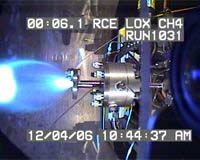Aerojet recently completed developmental testing of an innovative cryogenic oxygen/methane Reaction Control Engine (RCE) critical to ongoing lunar lander architectural decision making. Aerojet completed over 135 tests of the reaction control engine for NASA's Propulsion Cryogenic Advanced Development (PCAD) project of the Exploration Technology Development Program.
The Exploration Technology Development Program, based at Langley Research Center, strives to mature technology to support future human and robotic exploration missions for the Exploration Mission Systems Directorate at NASA Headquarters. The results exceeded project goals.
The NASA PCAD project, managed by NASA Glenn Research Center and supported by the NASA Johnson Space Center, was created to explore cryogenic propulsion technologies that potentially enable higher performing space vehicles through weight reduction and provide simplified ground operations by virtue of non-toxic propellants.
Aerojet's recent fast-paced design, build and test program has provided valuable risk reduction for the RCE, which is widely recognized as a key challenge in fielding non-toxic propulsion systems.
The cutting-edge engine technology integrates an injector-igniter assembly with two propellant valves resulting in an engine weight that is comparable to an earth-storable reaction control engine. The igniter further achieved 100% reliable ignition. "Aerojet's injector and igniter sea level testing exceeded operational pulsing requirements set by the project and provided extensive test data in support of NASA's Exploration Technology Development Program," said Mark Klem, PCAD Project Manager.
The most challenging requirement for any cryogenic reaction control engine is to produce repeatable thrust impulses. Aerojet achieved very small thrust impulses which enable fine in-space maneuvering operations and provide higher performance through efficient consumption of on-board propellants -- exceeding NASA's original objectives.
"Aerojet took on significant technical challenges in this RCE development program," said Julie Van Kleeck, Aerojet's vice president of Space Programs. Van Kleeck noted that "Aerojet's testing demonstrates that performance and operability issues associated with non-toxic propulsion technologies can be overcome."
Aerojet's successful test program provides the hot fire data needed to update the existing design and fabricate additional reaction control engines for delivery to NASA's White Sands Test facility and the NASA Glenn Research Center in early 2008 to support a full-propulsion module system test as well as extensive altitude engine testing.

